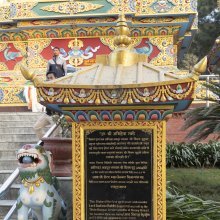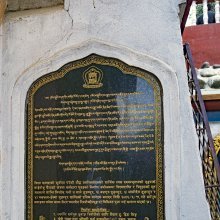Miti, Mitī, Miṭi, Mīti: 16 definitions
Introduction:
Miti means something in Hinduism, Sanskrit, the history of ancient India, Marathi, Hindi, Tamil. If you want to know the exact meaning, history, etymology or English translation of this term then check out the descriptions on this page. Add your comment or reference to a book if you want to contribute to this summary article.
Images (photo gallery)
India history and geography
Source: Cologne Digital Sanskrit Dictionaries: Indian Epigraphical GlossaryMiti.—(IA 20), cf. Saṃvat 1384 miti Bhādra-vadi 3 Guru-dine; probably a corruption of Sanskrit mita, ‘counted’, ‘calculated’. Note: miti is defined in the “Indian epigraphical glossary” as it can be found on ancient inscriptions commonly written in Sanskrit, Prakrit or Dravidian languages.

The history of India traces the identification of countries, villages, towns and other regions of India, as well as mythology, zoology, royal dynasties, rulers, tribes, local festivities and traditions and regional languages. Ancient India enjoyed religious freedom and encourages the path of Dharma, a concept common to Buddhism, Hinduism, and Jainism.
Languages of India and abroad
Marathi-English dictionary
Source: DDSA: The Molesworth Marathi and English Dictionarymitī (मिती).—f (S) Measuring or measure: also weighing or weight. 2 Determinate amount; definiteness or moderateness of degree or quantity; measure. Ex. tyācē pātakāsīṃ nāhīṃ kīṃ hō mitī || tumhī tyācī mati śuddha kēlī ||. 3 A specified or particular lunar day considered as a date. 4 fig. Interest (on money-loans). Ex. śēṅkaḍā cāra āṇē āmhāsa mitī paḍatī.
Source: DDSA: The Aryabhusan school dictionary, Marathi-Englishmitī (मिती).—f Measure. A date. Fig. Interest (on money-loans).
Marathi is an Indo-European language having over 70 million native speakers people in (predominantly) Maharashtra India. Marathi, like many other Indo-Aryan languages, evolved from early forms of Prakrit, which itself is a subset of Sanskrit, one of the most ancient languages of the world.
Sanskrit dictionary
Source: DDSA: The practical Sanskrit-English dictionaryMiti (मिति).—f. [mā-mi-ktin]
1) Measuring, a measure, weight.
2) Accurate knowledge.
3) Proof, evidence.
4) Determination.
Derivable forms: mitiḥ (मितिः).
Source: Cologne Digital Sanskrit Dictionaries: Shabda-Sagara Sanskrit-English DictionaryMiti (मिति).—f.
(-tiḥ) 1. Measuring, measure. 2. Weighing, weight. 3. Value. 4. Knowledge. 5. Proof, evidence. E. mā to measure, aff. ktin .
Source: Cologne Digital Sanskrit Dictionaries: Benfey Sanskrit-English DictionaryMiti (मिति).—i. e. mā + ti, f. 1. Measuring. 2. Determining. 3. Knowledge.
Source: Cologne Digital Sanskrit Dictionaries: Cappeller Sanskrit-English DictionaryMiti (मिति).—1. [feminine] measure, weight, value.
--- OR ---
Miti (मिति).—2. [feminine] erecting, establishing.
Source: Cologne Digital Sanskrit Dictionaries: Monier-Williams Sanskrit-English Dictionary1) Miti (मिति):—[from mi] 1. miti f. (for 2. See p. 816, col. 1) fixing, erecting, establishing, [Ṛg-veda]
2) [from mita] 2. miti f. (for 1. See p. 815, col. 3) measuring, measure, weight, [Varāha-mihira’s Bṛhat-saṃhitā; Śārṅgadhara-saṃhitā]
3) [v.s. ...] accurate knowledge, evidence, [Māṇḍūkya-upaniṣad, 12 mantra]
Source: Cologne Digital Sanskrit Dictionaries: Yates Sanskrit-English DictionaryMiti (मिति):—(tiḥ) 2. f. Measuring; weighing; knowledge; proof.
Source: DDSA: Paia-sadda-mahannavo; a comprehensive Prakrit Hindi dictionary (S)Miti (मिति) in the Sanskrit language is related to the Prakrit word: Mii.
[Sanskrit to German]
Sanskrit, also spelled संस्कृतम् (saṃskṛtam), is an ancient language of India commonly seen as the grandmother of the Indo-European language family (even English!). Closely allied with Prakrit and Pali, Sanskrit is more exhaustive in both grammar and terms and has the most extensive collection of literature in the world, greatly surpassing its sister-languages Greek and Latin.
Hindi dictionary
Source: DDSA: A practical Hindi-English dictionary1) Miti (मिति):—(nf) measure/measurement; limit.
2) Mitī (मिती):—(nf) a date according to the lunar month; ~[kāṭā] discount; —[ḍālanā] to date (a document).
...
Kannada-English dictionary
Source: Alar: Kannada-English corpusMiti (ಮಿತಿ):—
1) [noun] extent, quality or size as determined by measuring; measurement.
2) [noun] quantity or amount of heaviness as expressed in terms of a standard unit; weight.
3) [noun] the outer limits of anything; border.
4) [noun] a rule ordinance or law for regulating; regulation.
5) [noun] the starting and ending points of time of a specified period or term.
6) [noun] an affirmative statement.
7) [noun] the fact of having seen, witnessed something actually happened.
8) [noun] the quality of being not moved or shaken easily, not yielding easily under pressure; firmness.
Kannada is a Dravidian language (as opposed to the Indo-European language family) mainly spoken in the southwestern region of India.
Tamil dictionary
Source: DDSA: University of Madras: Tamil LexiconMiṭi (மிடி) noun
1. Poverty, want; வறுமை. (சூடாமணிநிகண்டு) [varumai. (sudamaninigandu)]
2. Affliction; துன்பம். மிடியென்னுங் காரணத்தின் [thunpam. midiyennung karanathin] (நாலடியார் [naladiyar], 56).
--- OR ---
Miṭi (மிடி) [miṭittal] 11 intransitive verb < மிடி. [midi.]
1. To be poverty-stricken, destitute; வறுமை யுறுதல். மிடித்தார்க்குச் சுற்றமின்றா யிருந்தது [varumai yuruthal. miditharkkus surraminra yirunthathu] (சீவகசிந்தாமணி [sivagasindamani] 2535, உரை [urai]).
2. To be scanty; குறைவுறுதல். [kuraivuruthal.]
--- OR ---
Miti (மிதி) [mitittal] 11 transitive verb cf. mṛd.
1. To tread on; அடிவைத்தல். சேற்றை மிதிக்காதே. [adivaithal. serrai mithikkathe.]
2. To tread down, trample on; காலால் துவைத் தல். மிதித்தேறி யீயுந் தலைமே லிருத்தலால் [kalal thuvaith thal. mithitheri yiyun thalaime liruthalal] (நாலடியார் [naladiyar], 61).
3. To insult, dishonour; அவமதித்தல். மிதித்திறப்பாரு மிறக்க [avamathithal. mithithirapparu mirakka] (நாலடியார் [naladiyar], 61).
4. To rush or dash against; to attack, as a door of a fort; பாய்தல். போரார் கதவ மிதித்த தமையுமோ [paythal. porar kathava mithitha thamaiyumo] (கலித்தொகை [kalithogai] 90, 12). — intransitive To jump; குதித்தல். (சூடாமணிநிகண்டு) [kuthithal. (sudamaninigandu)]
--- OR ---
Miti (மிதி) noun < மிதி-. [mithi-.] [K. midi.]
1. Treading; மிதிக்கை. மிதியின் றிடைபொலி சென் றன [mithikkai. mithiyin ridaipoli sendamizhppathirigai rana] (இரகுவமிசம் யாகப். [iraguvamisam yagap.] 21).
2. Tread; அடிவைப்பு. மகனார்தம் மிதியாம் [adivaippu. maganartham mithiyam] (இரகுவமிசம் தசரதன்சாப. [iraguvamisam thasarathansapa.] 109).
3. Step in a tank or well; படிக்கல். [padikkal.] (C. G.)
4. Treadle of weaver’s loom; நெய்வார் கருவிகளு ளொன்று. ((சங்கத்தகராதி) தமிழ்சொல்லகராதி) [neyvar karuvigalu lonru. ((sangathagarathi) thamizhsollagarathi)]
5. Food trampled and formed into a ball; மிதித்துத் திரட்டப்பெற்ற கவளம். நெய்ம்மிதி பெறாஅது [mithithuth thirattapperra kavalam. neymmithi peraathu] (புறநானூறு [purananuru] 44).
6. Walking; gait; நடை. பலதுரக மிதியிற் றகுபலதாள விதம் பெற்றிட [nadai. palathuraga mithiyir ragupalathala vitham perrida] (இரகுவமிசம் யாகப். [iraguvamisam yagap.] 18).
--- OR ---
Miti (மிதி) noun < miti.
1. Measure; அளவு. [alavu.]
2. Knowledge; ஞானம். ((சங்கத்தகராதி) தமிழ்சொல்லகராதி) [gnanam. ((sangathagarathi) thamizhsollagarathi)]
3. Intellect; அறிவு. (இலக்கியச் சொல்லகராதி) [arivu. (ilakkiyas sollagarathi)]
4. Evidence; அத்தாட்சி. (யாழ்ப்பாணத்து மானிப்பாயகராதி) [athadsi. (yazhppanathu manippayagarathi)]
--- OR ---
Mīti (மீதி) noun
1. Hedge caper. See காட்டுக்கத்திரி. (வைத்திய மலையகராதி) [kattukkathiri. (vaithiya malaiyagarathi)]
2. Strychnine tree. See எட்டி. ((சங்கத்தகராதி) தமிழ்சொல்லகராதி) [etti. ((sangathagarathi) thamizhsollagarathi)]
--- OR ---
Mīti (மீதி) noun < மிகுதி. [miguthi.] Remainder, that which is left; மிச்சம். [micham.] Colloq.
Tamil is an ancient language of India from the Dravidian family spoken by roughly 250 million people mainly in southern India and Sri Lanka.
Nepali dictionary
Source: unoes: Nepali-English DictionaryMiti (मिति):—n. date; day; limit; time;
Nepali is the primary language of the Nepalese people counting almost 20 million native speakers. The country of Nepal is situated in the Himalaya mountain range to the north of India.
See also (Relevant definitions)
Starts with (+11): Miti-kirai, Mitichapa, Mitigey, Mitikirai, Mitikisu, Mitikorai, Mitila, Mitile, Mitili, Mitimaram, Mitimga, Mitimiru, Mitimiti, Mitinee-baako, Mitini, Mitini-bako, Mitintarattai, Mitintu, Mitipakal, Mitipalakai.
Ends with (+119): Adananikshepanasamiti, Adanasamiti, Amarasamiti, Amiti, Anugamana-samiti, Anumiti, Anyathanumiti, Arthamiti, Arthisamiti, Arumiti, Atimiti, Ayuhparimiti, Ayurmiti, Bhadratasamiti, Bhashasamiti, Bhumiti, Camiti, Cantimiti, Chimiti, Chirmiti.
Full-text (+127): Samamiti, Mithi, Anumiti, Mithila, Pramiti, Mii, Nirmiti, Upamiti, Saramiti, Mitiyitu, Suranjan meethi, Uplet meethi, Atish meethi, Atis meethi, Khatti meethi, Bato, Phoroto, Burmese fishtail palm, Clustering fishtail palm, Atis meethi chalu.
Relevant text
Search found 29 books and stories containing Miti, Mitī, Miṭi, Mīti, Mithi, Midi, Midhi, Meethi; (plurals include: Mitis, Mitīs, Miṭis, Mītis, Mithis, Midis, Midhis, Meethis). You can also click to the full overview containing English textual excerpts. Below are direct links for the most relevant articles:
Nirvikalpaka Pratyaksha (study) (by Sujit Roy)
The Brahmanda Purana (by G.V. Tagare)
Chapter 64 - The description of Nimi dynasty (vaṃśa) < [Section 3 - Upodghāta-pāda]
Puranic encyclopaedia (by Vettam Mani)
Rig Veda (translation and commentary) (by H. H. Wilson)
Rig Veda 3.8.3 < [Sukta 8]
Ramayana of Valmiki (by Hari Prasad Shastri)
Chapter 57 - The End of the Story of Vasishtha and Nimi < [Book 7 - Uttara-kanda]
Chapter 71 - King Janaka gives an account of the succession and his dynasty < [Book 1 - Bala-kanda]
Ramayana (by Manmatha Nath Dutt)
Chapter LXXI < [Book 1 - Bāla-kāṇḍa]




